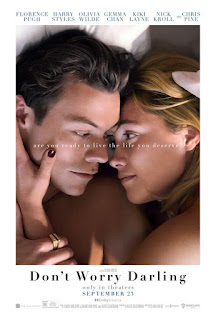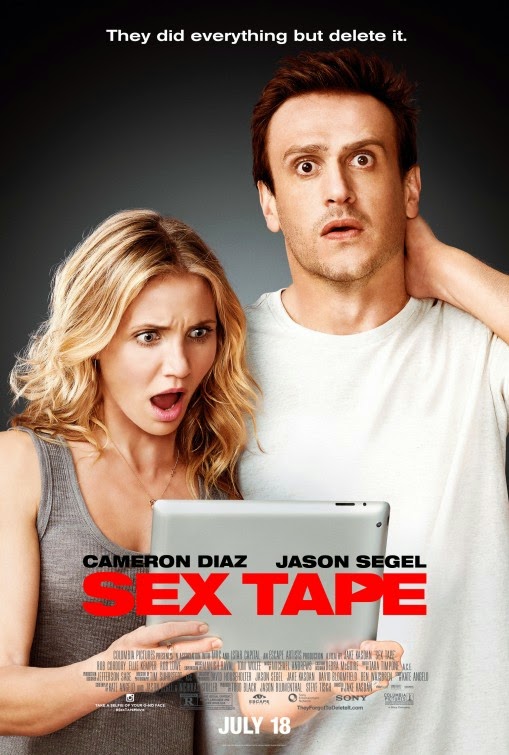"Don't Worry Darling" an absorbing, mostly unsettling "Stepford" riff that works best when being ambiguous
Don’t Worry Darling (2022)
No need to worry, the deviously chic “Don’t Worry Darling” has more to offer than the publicity of its behind-the-scenes drama, which we won’t even get into, darling (that’s what Google is for). Following up Olivia Wilde’s sparkling directorial debut—2019’s fresh, smart, funny “Booksmart”—this is a much more ambitious and visually striking undertaking in which she directs another script by writer Katie Silberman. Being set in a patriarchal world without feminism, “The Stepford Wives” is an easy comparison, but “Don’t Worry Darling” is kept fresh and absorbing as its own paranoid through-the-looking-glass nightmare in suburban conformity and subjugation.
Alice Chambers (Florence Pugh) and her husband Jack (Harry Styles) live in a picture-perfect cul-de-sac of midcentury modern homes in a close-knit desert community called “The Victory Project,” circa the 1950s. They’re the only couple without children, and that’s by choice, but they couldn’t be happier. Every morning, the wives wave to their husbands, pulling out in their Ford Thunderbird Roadsters in unison to work at the electrical engineering headquarters on a classified operation in “the development of progressive materials.” When the subservient wives aren’t tending to the homes and preparing a hot meal for their husbands’ arrival, they take a bus to the shopping center and take a ballet class. Victory founders Frank (Chris Pine) and Shelley (Gemma Chan) make it their mission statement to change the world. Of course, the wives are kept in the shadows about what their husbands actually do, but it’s all for their safety, right? Once one of the wives, Margaret (KiKi Layne), begins looking catatonic and being very vocal about Victory lying to them, Alice begins thinking for herself and asking questions. Or, is Alice just losing it?
Working with material that calls for specific period dressing, Olivia Wilde impresses once again with a clear vision and a sophisticated filmic language that’s grown since her last film. Having all the right collaborators in Wilde’s corner, the film is intoxicating to look at and listen to, giving the illusion that the “what” is actually dread-inducing and unpredictable. Dazzling production design and costume design aside, cinematographer Matthew Libatique’s work is stunning, his camera a window into a dreamy, sun-baked Shangri-La before the façade cracks and rots. The sound design and John Powell’s score of gnawing psychosis also mesmerize and put one on edge.
The sinister goings-on in this ultramodern, ultra-sleek bubble tip their hand when Alice cracks open some empty eggs and then sights a possible plane crash. But things do get weirder from there, indeedy. As if David Lynch directed a Marilyn Manson music video, there are disorienting flashes of a fever dream and visions of Busby Berkeley-style dancers. Alice’s breaks with reality are unsettling and evocative, as she Saran wraps a bowl of food before Saran wrapping her own head or cleans a glass door before the wall behind her closes in. Katie Silberman’s script definitely intrigues with its “something is afoot here” concept about Kool-Aid-drinking groupthink, even when it gets less ambiguous and daring toward the film’s “dot the i’s and cross the t’s” explanation. The chosen resolution to the mystery isn’t unsatisfying per se, but with many questions raised in the moment and out of the theater, it can’t quite compete with the getting-there.
With all the poise and instincts beyond her years, Florence Pugh captivates in every frame and makes Alice’s psychological unraveling riveting to watch. She is unimpeachable playing another woman who is doubted, and much like her final moments in “Midsommar,” Pugh does a lot with the slow formation of a frown. Proving wrong all the naysayers who just want to see others fail, Harry Styles is more than fine as Jack. He fits right in with this group of actors and, for a matinee idol who's just getting started, up to the challenge of a few emotional blowups. Perhaps Pugh makes Styles better, but they do even exhibit some sexual chemistry, too. Chris Pine makes chilling use of his All-American good looks as the leader of the boys’ club. A prickly dinner party scene where Alice challenges Frank is a standout that crackles with tension, and Gemma Chan is also not to be underestimated in that scene or in general as Frank’s wife Shelley.
Stewing in Alice's suspicions, the majority of the film is tantalizing before revealing what lies beneath the veneer of daytime cocktails and having your husband perform cunnilingus on you on top of a perfectly set dinner table. The puzzle-box plotting probably can't be held up too closely to scrutiny, but the bigger thorn in one's side is that the answers don't really give the viewer as much to ponder afterward. The supporting cast is an enticing one, even if not everyone gets enough support from the script. Olivia Wilde, herself, gets to be boozy and brassy as the chainsmoking Bunny, Alice's fellow housewife friend; hilariously expressive comic Kate Berlant is a hoot as the pregnant Peg; Nick Kroll has fun reveling in one lane as Bunny’s boorish husband Bill; and Timothy Simons is all but missing a mustache to twirl as the obviously untrustworthy resident Dr. Collins. KiKi Layne (2018’s “If Beale Street Could Talk”) is woefully underutilized as Margaret, who could’ve been afforded much more time to be developed as a person rather than a plot catalyst. In spite of the script not laying down enough groundwork to make the "a-ha" moment really sting, “Don’t Worry Darling” is too strange, classily lensed, and compelling to dismiss Wilde’s entire mission.
Grade: B
Warner Bros. Pictures is releasing “Don’t Worry Darling” (123 min.) in theaters on September 23, 2022.












Comments
Post a Comment